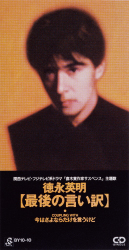You can help expand this article with text translated from the corresponding article in Japanese. (September 2018) Click for important translation instructions.
|
| "Saigo no Iiwake" | ||||
|---|---|---|---|---|
 | ||||
| Single by Hideaki Tokunaga | ||||
| from the album Realize | ||||
| Language | Japanese | |||
| English title | Last Excuse | |||
| B-side | "Ima wa Sayonara Dake wo Iukedo" | |||
| Released | October 25, 1988 | |||
| Recorded | 1988 | |||
| Genre | ||||
| Length | 11:24 | |||
| Label | Apollon | |||
| Composer(s) | Hideaki Tokunaga | |||
| Lyricist(s) | Keiko Asō | |||
| Hideaki Tokunaga singles chronology | ||||
| ||||
| Music video | ||||
| Saigo no Iiwake on YouTube | ||||
"Saigo no Iiwake" (最後の言い訳, lit. "Last Excuse") is the sixth single by Japanese singer-songwriter Hideaki Tokunaga. Written by Tokunaga and Keiko Asō, the single was released through Apollon on October 25, 1988.
Background
Tokunaga co-wrote "Saigo no Iiwake" after experiencing a painful breakup with someone he was dating at the time. As a result of the breakup, he involuntarily shed tears while performing the song on the TBS music show The Best Ten.
The song was used as the opening theme of the Kansai TV/Fuji TV drama series Naokishō Sakka Suspense (直木賞作家サスペンス, Naoki Prize Writer Suspense). It was also featured in the 1993 film Tora-san's Matchmaker.
The song is included in Tokunaga's compilation albums Single Collection (1986~1991) (1998), Beautiful Ballade (2006), Singles Best (2008), Vocalist & Ballade Best (2011), and All Time Best Presence (2016). Tokunaga re-recorded the song in the albums Self Cover Best ~ Kagayaki Nagara~ (2003) and Eien no Hateni ~ Self Cover Best I ~ (2018).
Chart performance
"Saigo no Iiwake" reached number 4 on Oricon's singles chart, number 100 on Oricon's 1988 year-ending chart and number 69 on Oricon's 1989 year-ending chart.
Track listing
All music is composed by Hideaki Tokunaga
| No. | Title | Lyrics | Length |
|---|---|---|---|
| 1. | "Saigo no Iiwake (最後の言い訳, "Last Excuse")" | Keiko Asō | 6:17 |
| 2. | "Ima wa Sayonara Dake wo Iukedo (今はさよならだけを言うけど, "Right Now, I Just Say Goodbye")" | Hideaki Tokunaga | 4:47 |
| Total length: | 11:24 | ||
Chart position
| Charts (1988) | Peak position |
|---|---|
| Japanese Oricon Singles Chart | 4 |
Cover versions
"Saigo no Iiwake" has been covered by Midori Karashima, Satoshi Furuya, Ruru Honda, and Junko Yamamoto.
Outside Japan, the song became popular in the Philippines, when it was covered by Ted Ito as "Ikaw Pa Rin", Keempee de Leon as "My One and Only", Maso as "Kailanman" in Tagalog and "Come Back Home" in English, and as an instrumental by saxophonist Jake Concepcion.
References
- "徳永英明 / 最後の言い訳". Stereo Records. Retrieved 2022-07-26.
- "徳永英明 最後の言い訳 AY07-97". Snow Records. Retrieved 2022-07-26.
- "Album - Discography". Hideaki Tokunaga Official Site. Retrieved 2018-09-27.
- ^ "最後の言い訳 | 徳永英明". Oricon. Retrieved 2022-07-26.
- "Covers of Saigo no Iiwake". Who Sampled. Retrieved 2018-09-25.
External links
- Official website
- "Saigo no Iiwake" at MusicBrainz (list of releases)
- "Saigo no Iiwake" at Discogs
| Hideaki Tokunaga | |
|---|---|
| Studio albums | |
| Singles | |